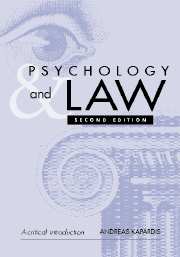Book contents
- Frontmatter
- Contents
- List of case studies
- Acknowledgements
- Foreword
- 1 Psycholegal research: an introduction
- 2 Eyewitnesses: key issues and event characteristics
- 3 Eyewitnesses: the perpetrator and interviewing
- 4 Children as witnesses
- 5 The jury
- 6 Sentencing as a human process
- 7 The psychologists as expert witnesses
- 8 Persuasion in the courtroom
- 9 Detecting deception
- 10 Witness recognition procedures
- 11 Psychology and the police
- 12 Conclusions
- Notes
- References
- Author index
- Subject Index
5 - The jury
Published online by Cambridge University Press: 05 December 2011
- Frontmatter
- Contents
- List of case studies
- Acknowledgements
- Foreword
- 1 Psycholegal research: an introduction
- 2 Eyewitnesses: key issues and event characteristics
- 3 Eyewitnesses: the perpetrator and interviewing
- 4 Children as witnesses
- 5 The jury
- 6 Sentencing as a human process
- 7 The psychologists as expert witnesses
- 8 Persuasion in the courtroom
- 9 Detecting deception
- 10 Witness recognition procedures
- 11 Psychology and the police
- 12 Conclusions
- Notes
- References
- Author index
- Subject Index
Summary
‘No freeman shall be seized, or imprisoned, or disposed or outlawed, or in any way destroyed; nor will we condemn him, nor will we commit him to prison, excepting by the lawful judgement of his peers, or by the law of the land.’ (Clause 39 Magna Carta 1215)
‘A better instrument could scarcely be imagined for achieving uncertainty, capriciousness, lack of uniformity, disregard of former decisions – utter unpredictability.’ (Judge Jerome Frank, 1949:172)
‘The verdicts juries give may sometimes seem willfully perverse … Stories provide answers to the pressing questions of identity, mental state, actions and circumstances that are required to establish blame. There is a story behind every verdict.’ (Stephenson, 1992:196)
‘Because of the problem-driven nature of most jury research, however, no overarching theoretical model has emerged around which to structure a comprehensive review of the broad empirical literature.’ (Devine et al., 2001:625).
Introduction
In The Book of Magna Carta Hindley (1990:ix–x) comments that the words in the above quotation from clause 39, which has been the basis for the institution of trial by jury, ‘coined by a distant society in a half-forgotten language, have been treasured by generations of men and women in the English-speaking world as a safeguard of individual liberty’. Darbyshire (1991:742), however, reminds us that, contrary to popular belief, legal historians (for example, Holdsworth, 1903:59) have pointed out (but have gone largely unnoticed by students of the jury) that clause 39 has nothing to do with trial by jury. The notion of being tried by one's peers existed long before the Magna Carta.
- Type
- Chapter
- Information
- Psychology and LawA Critical Introduction, pp. 126 - 162Publisher: Cambridge University PressPrint publication year: 2002



